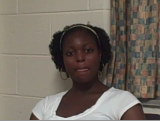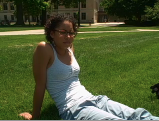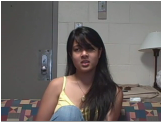Navigation:
Video Segment 2: What were your parents' attitudes toward literacy and/or education?
Video Segment 3: How would your life be different if you didn't know how to read and write?
Video Segment 4: What is your experience with and attitude toward computers?
Lessons 1 & 2: Narrating Technology Use
Lesson 3: Technology Resistance
Lesson 4: Complexity of Technological Engagements
Working Definitions of Technological Literacy and Narrative Analysis
- Chanelle Mays Transcript
- Saffiyah Madraswala Transcript
- Viktoriya Kamara Transcript
- Anne Jacobs Transcript
How would your life be different if you didn't know how to read and write?
In his book on literacy narratives, race, and citizenship, Morris Young writes that the literacy narrative "provides [the writers he studies] with both a form and function that inserts them into a common cultural script of American individualism and achievement through hard work and education" (Young, 53). This common cultural script is evident in the young women's interviews. When asked what their lives would be like if they didn't know how to read and write, they generally recoiled at the thought of such a situation. As they begin to answer, though, each draws on Young's "cultural script" to describe how terrible or horrible their lives might be. If Young is right, the constraints of this larger cultural narrative may have prevented them from formulating answers that fell too far outside the script they had been inserted into. Even Kamara, who begins by clarifying whether or not her illiterate self lives in the US, or presumably in the more orally-focused culture her father is from in West Africa, notes that life in the US at least would be impossible if she were illiterate. And Madraswala, who resists the idea of generalizing about illiteracy positively or negatively ends by saying to simply consider the possibility "made her heart sink."
Two of the interviewees comments imply a binary of literacy/illiteracy, which may be a function of the question. They describe being illiterate variously: being miserable, awful, crippling, causing dependency, preventing the lives they are currently living. By contrast, they describe literacy as a cause for happiness, a blessing, a gift, something that facilitates learning, and especially research.
Madraswala comes the closest to avoiding the literacy/illiteracy binary by arguing the impossibility of imagining such a situation. She takes a rhetorical stance that acknowledges the limits of her own ideological point of view. As Richardson (2004) notes: "Rhetorical stances are informed by and express certain ideological stances. Bakhtin (1981) is one scholar who has argued convincingly that the historical, ideological, and sociological context that one associates with literacy and language use influences meaning" (p. 167). By stepping out of her immediate response to question her inclinations, Madraswala reveals the complexity of her thoughts about literacy and reinforces the idea that the value of literacy is always contextually driven. A Bakhtinian interpretation of Madraswala's statement would explain that Madraswala's resistance to her own ideological leanings with regards to literacy gives her a different language with which to describe her own world, which is exactly what we see when she discusses her own summer project. Madraswala's project seeks to effect change and she relies upon her own literacy experiences and resources to effect that change.



